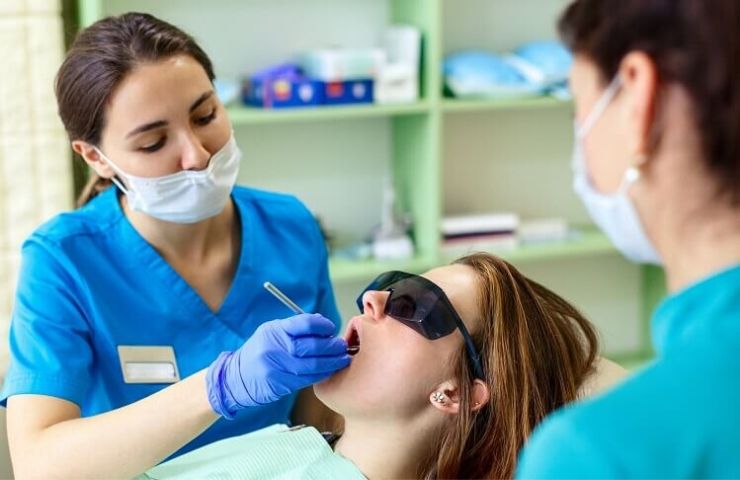
9 Things You Didn’t Know About Teeth
FROM THE HARM CAUSED BY STRESS TO THE BENEFITS OF SALIVA
As an aspiring dental assistant, your studies will expose you to many weird and interesting facts about teeth and how to properly take care of them. Part of your job once you graduate will be to share this information with your patients when you are teaching them about good oral care.
If you’re interested in becoming a dental assistant, consider enrolling in UEI College’s Dental Assistant Training Program. The great thing about the program is that it can be completed, and you can earn your diploma in as little as 10 months!
BELOW ARE NINE FUN FACTS THAT YOU MAY NOT KNOW ABOUT TEETH (YET).
Your Teeth Are Unique
Just like our fingerprints, every tooth in our mouth is completely unlike the rest or those of any other person on Earth. This means that every persons’ bite or smile is completely special to them. For this reason police departments are sometimes able to use dental records to identify a victim of a crime if fingerprints don’t work or are not available.
Your Tooth Enamel is Hard
As in really hard. The hardest substance your body is able to produce. This is so that teeth can chew food and begin the digestive process. Teeth are protected by an outer layer of enamel that acts like a shell that protects the softer tissue inside. While they function much like bones, teeth are actually stronger.
Stress Can Damage Your Teeth
Untreated stress can cause physical damage to your teeth, as well as hurting your teeth and gums. People who are stressed often grind or clench their teeth while they sleep, leading to cracked or worn down teeth and jaw issues. It can also lead to canker sores, and decreased saliva production. If you or someone you know is a nighttime grinder or clencher, talk to your dentist about a night guard to protect your teeth!
Most Adults Have 32 Teeth
This may seem like a pretty elementary fact, but a lot of people don’t realize that they will have (usually) 32 teeth throughout their entire adult lives, and that each tooth is designed to perform a specific job. We each have eight incisors (front teeth), four canine teeth (or cuspids), eight premolars, and 12 molars (the strongest crushing and chewing teeth). Historically, humans had more teeth, but today’s smaller jaws are resulting in the extraction of wisdom teeth—and in some cases people born without them altogether.
Our Mouths are Riddled with Bacteria
The human mouth is home to 300 different types of bacteria, and millions of the little germs band together in the plaque caused by food bits and sugars to attack your teeth. This gross little fact should make all of us think twice about going to bed without brushing!
Acid Is One of the Biggest Threats to Teeth
Acid causes permanent damage to teeth. This can come from bacteria that converts sugar and carbohydrates into acid, as well as acids found in soft drinks, citrusy foods, and sports drinks. Acid can cause the tooth enamel to corrode, breaking down and leading to cavities or tooth decay.
Cavities Can Happen to Anyone
As alluded to above, cavities are small holes in teeth caused by tooth decay—and they can become much larger and more painful if not caught and treated early. Anyone can develop cavities (even babies!) if they eat too many sugary or acidic foods and drinks, don’t practice good oral care, don’t get enough fluoride, or a few other factors. To make matters worse, even with the best oral health care, you can actually get cavities by kissing someone who transfers cavity-causing bacteria to you. Current treatment regimens for cavities include fluoride, fillings, crowns, and root canals.
Saliva is Your Antibacterial Friend
Saliva is actually the “first line of defense” in effective oral healthcare. The human body produces about a quart of saliva each day which is used to perform a number of functions, including washing away leftover food and helping to neutralize acids in the plaque on your teeth that can cause damage. Medications or other conditions that can cause dry mouth—even just sleeping!—may increase your risk of tooth decay because your mouth isn’t getting the typical antibacterial wash it is accustomed to.
YOUR DENTAL HEALTH REFLECTS YOUR PHYSICAL HEALTH
This is probably the most important fun fact to remember and share with your patients. Your oral health is part of your overall health, and may signal more serious conditions that your medical doctor will need to assess and treat. Untreated dental issues may even cause physical problems.
As many parents and dentists warn children: you only need to take care of the teeth you want to keep! Maintaining good oral health with twice daily brushing, daily flossing, regular checkups, and the details outlined above will help you and your future patients to stay healthy. So, commit these facts to memory and put them into practice once you graduate your dental assistant program!





